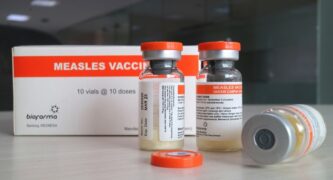
A “school-aged” child in Los Angeles County has died due to complications from a measles infection acquired in infancy, prompting health officials Thursday to urge residents to ensure they and their families are vaccinated against the illness.
According to the Los Angeles County Department of Public Health, the child who died was originally infected with measles as an infant, before being old enough to receive the measles vaccine. The vaccine is generally administered between 12 and 15 months of age.
The unidentified child recovered from the initial measles illness, but later developed and died from subacute sclerosing panencephalitis, also known as SSPE, a universally fatal complication that can occur in individuals who had measles early in life, according to county officials.
SSPE is a rare, progressive brain disorder that is a late complication of infection from the measles virus. SSPE usually develops two to 10 years after the initial measles infection, after the patient has seemingly fully recovered.
It is characterized by a gradual loss of neurological function, with death occurring one to three years after the initial diagnosis.
There is no cure or effective treatment for SSPE. It affects about 1 in 10,000 people with measles, but the risk may be much higher — about 1 in 600 — for those who get measles as infants, county officials noted.
Measles is highly contagious, and can be prevented with a vaccine. County health officials insisted that the measles-mumps-rubella, MMR, vaccine is effective and remains the best protection against measles and its potentially serious complications.
“This case is a powerful reminder of how dangerous measles can be, especially for our most vulnerable community members,” County Health Officer Dr. Muntu Davis said in a statement.
“Infants too young to be vaccinated rely on all of us to help protect them through community immunity. Vaccination is not just about protecting yourself — it’s about protecting your family, your neighbors, and especially children who are too young to be vaccinated,” he said.
Children typically receive their first dose of the MMR vaccine at 12- 15 months of age, and a second dose at four to six years. Infants six to 11 months of age should receive one dose of the MMR vaccine before traveling internationally or through an international hub, health officials said.
Infants who are younger than six months are too young to be vaccinated and rely on maternal antibodies and community immunity to reduce the risk of exposure.
The Department of Public Health urged county residents to check their immunization status, notify a healthcare provider if someone is at a higher risk, and watch for symptoms and take immediate actions if symptoms develop.
If symptoms do develop — such as fever (often higher than 101 degrees Fahrenheit), cough, runny nose, red eyes or a rash — residents should stay at home and avoid school, work and any gatherings, and call a healthcare provider immediately, officials said. Patients should not go into a health care facility without calling first.
As of Sept. 9, a total of 1,454 measles cases were reported in the United States this year. Most of the cases are linked to a measles outbreak in Texas, New Mexico, Kansas and Oklahoma.
County officials said the majority of the cases were in people who were unvaccinated or had unknown vaccination status. About 12% of the cases required hospitalization or isolation, and three individuals died from acute measles-related complications.
The last case of measles in a L.A. County resident was reported in August. So far in 2025, DPH recorded eight cases of measles in individuals who were in the county while infectious — four residents and four non-residents.
More information on clinics that offer free or low-cost immunization services, can be found at http://ph.lacounty.gov/vaccineclinics or by calling the Public Health InfoLine at 833-540-0473.
















